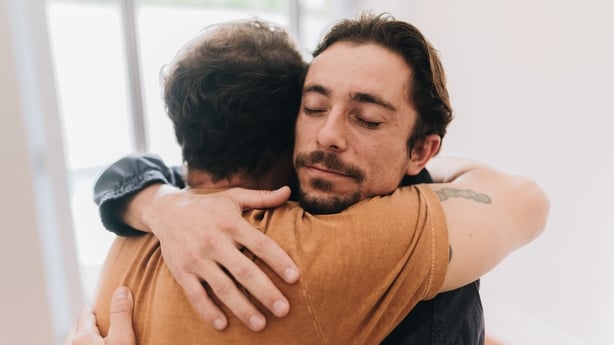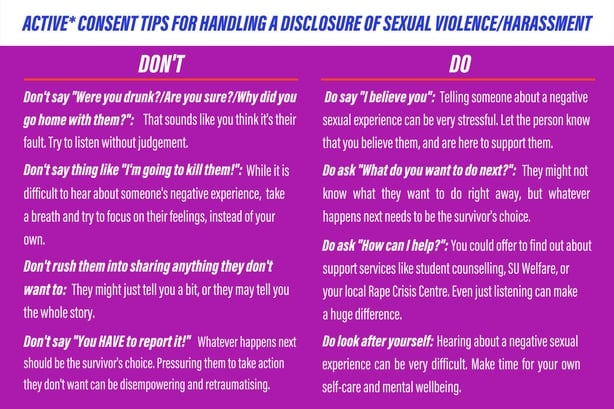Dr. Caroline West is a sex educator and host of the Glow West podcast, which focuses on sex, sexuality, and the body. Here, she writes about how to support a loved one if they've in a toxic relationship.
A huge part of sex education is learning about what healthy relationships are, and what red and green flags look like in real life. We take steps to protect ourselves by learning about boundaries, and healthy communication.
But what happens when it's not us we have to support, but our friends?

It can be frustrating to be on the outside and see your friend stay in an abusive or toxic relationship. You might feel like you just want to grab them and run away to safety with them or get angry with them when they refuse help.
In this situation, we have to pause, take a step back and try to understand with empathy.
It can be extremely hard to name what is going on when a victim is right in the middle of it, and if they have never experienced abuse before, or the current type of abuse, they might be finding it difficult to process and recognise it as abuse.
Or perhaps they don't want to recognise it because they feel ashamed, or they are used to it, or it's simply too much to say out loud and admit that they need help. Abusers use emotional manipulation to keep their victims living in hope that things will change, that those glimpses of good times will happen again, or the promises of change will actually be true this time.
It can also be extremely difficult for victims to come forward if their partner is well liked, or related to them, or are their career, and they will naturally have concerns about what happens next. Knowing what is available for them can help them if they are ready to leave.
Chat to your local refuge or Women's Aid Ireland and ask what support they offer so that you can explain it to your friend and give them the number to call if and when they need to.

Another resource for helping your loved one process is toointoyou.ie, where you can check if your relationship is something to be concerned about or not. You could send a link on social media or share it on your story so that others can see and know that you are a person that will support them.
Try not to mention the relationship all the time, or put pressure on them, as they need to work through their thoughts in their own time. You showing them that you won't judge them, and will help them when needed, is going to be worth its weight in gold.
When it comes to instances of sexual misconduct, you will naturally want to help your loved one as much as possible, though many of us don't always know how to.
In the University of Galway, Active* Consent and USI's 2020 national Sexual Experiences Survey revealed that 79% of college students who disclose sexual misconduct (rape, sexual assault, sexual harassment) told a close friend about their experiences, before they told anyone else. It's great to see that so many people trust their friends with this information, but how do we support them in the best way while also minding ourselves?

How we respond can make a huge difference to the person's ability to access further support. You don’t have to be a professional therapist, but simply saying the words 'I believe you’, or ‘I support you’, can have a life altering impact on a victim.
These three words can be the tiny spark a victim needs to know that someone does care what happened to them, and they won't be judged, just supported.
Victim blaming is still unfortunately prevalent in our society. When victims disclose, they might be faced with questions such as ‘what were you wearing’ or ‘why did you do X, Y, Z?’ The result of this means that victims stay silent for fear of being judged or not supported.
What someone was wearing or doing at the time when someone else made the decision to inflict violence on them is not important. If we are drunk or under the influence, we still deserve safety, not violence. Instead of focusing on questions about the victim, we can simply tell them that we support them, and offer to find a support service, and treat them with kindness.

It can be a natural urge to tell a victim that they have to go to the police or therapy right away, but the reality of this is that it puts pressure on the victim to have to make a decision right away when they are not ready.
Instead, we can support them by saying that there are support options available, give them a list of local and national supports, and tell them when they are ready, you will support them to access the services. Just knowing the support services are there if and when a person is ready to use them, can be enough for now.
Looking after yourself is also extremely important. If you feel upset about something a friend tells you, or don’t know how to help them, you can contact your local refuge or rape crisis centre who will offer a debriefing service or explain what they can offer so that you can empower yourself to know what to do, and how to mind yourself in the process. Hearing these disclosures can be difficult, but you are not alone.
Friends make life enjoyable and make great memories with us but knowing how to support each other in the bad times is just as important if we want to keep the good times flowing.
If you have been affected by issues raised in this story, please visit: www.rte.ie/helplines.
The views expressed here are those of the author and do not represent or reflect the views of RTÉ.

